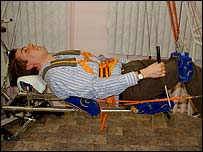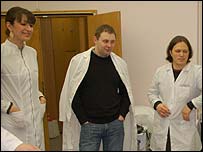|
Inside the Mars-500 'spaceship'
Inside the Mars-500 'spaceship'
Russia's ambitious plan to put a group of prospective cosmonauts in isolation for 17 months, as a potential first step of a mission to Mars, will start in a year's time.
Richard Hollingham of BBC World Service's Discovery programme gained rare access to the Mars-500 project's home at the Institute of Biomedical Problems in Moscow, to take a look at the preparations under way there.

Special exercise pulleys will prevent muscle wastage in space
|
Early next year, six Russian cosmonauts will climb through the hatch of the Mars-500 "spaceship" and not come out for over 500 days. The mock-up of a Martian craft is the first part of an ambitious project to send humans to Mars.
"The Mars-500 project is envisaged as an answer to the big question of whether a human being can realise a Martian flight - taking into account all the limitations and restrictions which are characteristic of this flight," says deputy director of the institute, Dr Viktor Baranov, who has overall responsibility for the Mars 500 experiment. "We need to understand that in a manned flight, the people are the most vulnerable thing."
Napkin shower
The institute is very busy. Because not all aspects of the Mars mission can be simulated in the ground-based Mars-500 project, other experiments are being conducted in parallel. Obviously, once any real mission to Mars got under way, a crew member could not simply leave when they felt like it - so Mars-500 will involve numerous studies of autonomy and isolation. The scientists will also be watching the crew's psychological response to being confined, in order to watch for conflicts.
And they will study the effectiveness of telemedicine, as there will be no hospital on the ship.

Scientists will constantly monitor the health of the 'cosmonauts'
|
The Mars-500 mock-up features the cramped personal quarters that would be an inevitable part of a real craft. Each cosmonaut has a narrow bed, some small shelves, a desk and a wardrobe. There is no shower - instead, the cosmonauts clean themselves in a heat chamber like a sauna, and use napkins to scrape off the dirt. Scientists here are keen to stress, however, that the Mars-500 craft is not a prison and that if a crew member wants to leave they can do so. It also may be the case that doctors recommend a person leaves based on their medical data, or if the state of the facility drops to a level where it is affecting health and safety.
However, ultimately the institute does want people who can last the full 500 days - which means it takes a special kind of person to volunteer. They are looking for highly-motivated people to form a team which will include a physician, a biologist, an IT specialist and engineer.
'One organism, one body'
 |
"The government wants to be on the safe side; it wants to know what technologies we have"
Anatoly Grigoriev, director of the Institute of Biomedical Problems
|
Sergei Ryazansky is a young cosmonaut who works at the Institute of Biomedical Problems. He has not yet been into space, but has been in the simulation - and would like to be one of the first to put his name forward for a real mission to Mars. "Training of crew members - especially their personal and psychological training - must be at a really high level," he said.
In the Autumn we had a technical crew that I commanded for two weeks. We were testing all the equipment of the module. One day I saw one guy not acting like usual. He was missing his girlfriend. "It is really important to see such things and help; to give him work to keep him busy. The only way to survive such an extreme flight will be working as one organism, one body; helping each other, discussing everything." To make the training exercise more realistic, the designers have brought in a time delay. Because it can take around 20 minutes for a message to travel from Mars to Earth, it takes this amount of time in the simulation. This means there can be no real-time conversations with friends and family - and that, in moments of crisis, the crew will have to make crucial decisions themselves. Meanwhile, the cosmonauts will also have to deal with the impact of prolonged weightlessness on the human body. Inesa Koslovska from the department of Sensory, Motor and Physiology and Countermeasures has been tracking what happens when people spend long periods away from gravity.
"Muscles immediately start to deteriorate" she says. This is followed by changes in cardio-vascular function and all metabolic processes, she says. "Then our bones start to deteriorate, because they get their signals from the muscles," she adds. In space all of this would not matter - but as soon as the cosmonauts returned to Earth, they would be so weak they would not be able to stand.
First step

Russia has continued space launches from bases in Kazakhstan
|
Dr Koslovska found that the main trigger for these changes is muscular unloading, so she developed a number of counter-measure exercises to allow the cosmonauts to keep muscle tone in space. The most important is a specially-developed treadmill, on which a suit is attached via elastic pulleys. Instead of gravity, the runner has to strain against the tension of the pulleys. "We don't have weight in space - but in this suit, you do," Dr Koslovska says. Of course, Mars-500 remains only the first step - the decision to commit so much time and energy to a Mars mission has not been explicitly backed by the Kremlin. But as Anatoly Grigoriev - director of the Institute of Biomedical Problems - points out, neither has it been discouraged. "The government wants to be on the safe side; it wants to know what technologies we have," he says. "When these factors are gathered, it will be easier to convince taxpayers at large that there is a possibility of success for such a mission. The time has come now when the knowledge has been gathered. The mission can be undertaken with a possibility of success."
BBC News, 03.03.2008
http://newsvote.bbc.co.uk/mpapps/pagetools/print/news.bbc.co.uk/1/hi/sci/tech/7267689.stm
|